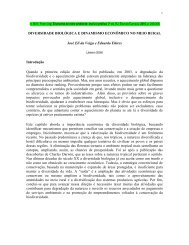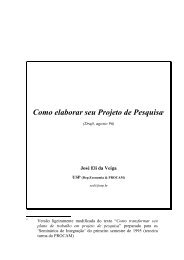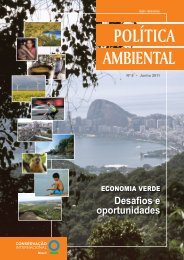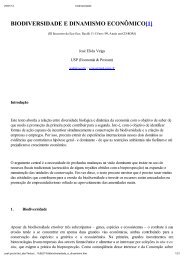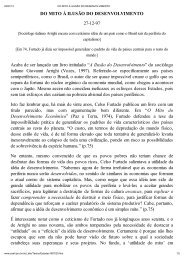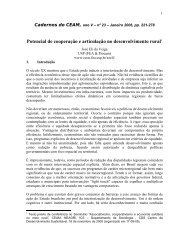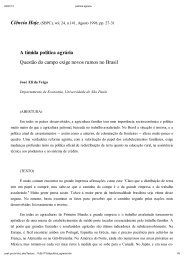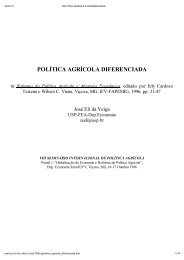sustainable development 20 years on from the ... - José Eli da Veiga
sustainable development 20 years on from the ... - José Eli da Veiga
sustainable development 20 years on from the ... - José Eli da Veiga
Create successful ePaper yourself
Turn your PDF publications into a flip-book with our unique Google optimized e-Paper software.
130<br />
Table II.6<br />
AGRICULTURAL PRODUCTIVITY LOSSES ACCORDING TO CLIMATE CHANGE SCENARIO A2<br />
(Percentages of agricultural gross domestic product (GDP))<br />
Country<br />
Agricultural GDP<br />
as a percentage of<br />
total GDP, <str<strong>on</strong>g>20</str<strong>on</strong>g>08<br />
Percentage reducti<strong>on</strong><br />
in agricultural GDP<br />
by <str<strong>on</strong>g>20</str<strong>on</strong>g><str<strong>on</strong>g>20</str<strong>on</strong>g><br />
Percentage reducti<strong>on</strong><br />
in agricultural GDP<br />
by <str<strong>on</strong>g>20</str<strong>on</strong>g>50<br />
Percentage reducti<strong>on</strong><br />
in agricultural GDP<br />
by 2100<br />
Bolivia<br />
(Plurinati<strong>on</strong>al State of) 12.1 17.8 18.5 19.9<br />
Chile 5.4 3.5 7.2 7.3<br />
Ecuador 10.5 8.0 16.3 18.0<br />
Paraguay 22.1 8.0 16.1 28.0<br />
Peru 6.7 5.5 7.1 9.6<br />
Source: Ec<strong>on</strong>omic Commissi<strong>on</strong> for Latin America and <strong>the</strong> Caribbean (ECLAC)/Global Mechanism of <strong>the</strong> United Nati<strong>on</strong>s<br />
C<strong>on</strong>venti<strong>on</strong> to Combat Desertificati<strong>on</strong>.<br />
6. Water resource management<br />
The issue of water was addressed in chapter 18 of Agen<strong>da</strong> 21. Subsequently, <strong>the</strong> Plan of Implementati<strong>on</strong><br />
for <strong>the</strong> World Summit <strong>on</strong> Sustainable Development emphasized <strong>the</strong> importance of: access to safe drinking<br />
water and basic sanitati<strong>on</strong>; developing plans for <strong>the</strong> integrated management and efficient use of water<br />
resources; and facilitating access to informati<strong>on</strong> <strong>on</strong> <strong>the</strong> <str<strong>on</strong>g>sustainable</str<strong>on</strong>g> use of water resources. In <str<strong>on</strong>g>20</str<strong>on</strong>g>03 <strong>the</strong><br />
United Nati<strong>on</strong>s established <strong>the</strong> Internati<strong>on</strong>al Decade for Acti<strong>on</strong>, “Water for Life” <str<strong>on</strong>g>20</str<strong>on</strong>g>05–<str<strong>on</strong>g>20</str<strong>on</strong>g>15, <strong>the</strong> main<br />
objective of which is to promote activities aimed at meeting, by <str<strong>on</strong>g>20</str<strong>on</strong>g>15, <strong>the</strong> commitments <strong>on</strong> water,<br />
including <strong>the</strong> Millennium Development Goals of halving, by <str<strong>on</strong>g>20</str<strong>on</strong>g>15, <strong>the</strong> proporti<strong>on</strong> of people without<br />
<str<strong>on</strong>g>sustainable</str<strong>on</strong>g> access to safe drinking water and basic sanitati<strong>on</strong> as well as to stop <strong>the</strong> un<str<strong>on</strong>g>sustainable</str<strong>on</strong>g><br />
exploitati<strong>on</strong> of water resources. 13<br />
Latin America and <strong>the</strong> Caribbean is <strong>on</strong>e of <strong>the</strong> regi<strong>on</strong>s with <strong>the</strong> greatest abun<strong>da</strong>nce of water <strong>on</strong><br />
<strong>the</strong> planet. It harbours <strong>on</strong>e third of <strong>the</strong> world’s renewable water resources and, although it has <strong>on</strong>ly 15%<br />
of <strong>the</strong> world’s land mass and 8.4% of its populati<strong>on</strong>, it receives 29% of global precipitati<strong>on</strong> (United<br />
Nati<strong>on</strong>s, <str<strong>on</strong>g>20</str<strong>on</strong>g>10). However, water distributi<strong>on</strong> is highly unequal, and water resources are strained by<br />
multiple factors, such as excessive abstracti<strong>on</strong> for agriculture and mining, aquifer depleti<strong>on</strong>, increasing<br />
water polluti<strong>on</strong>, deforestati<strong>on</strong> and <strong>the</strong> destructi<strong>on</strong> of catchment basins and replenishment areas (United<br />
Nati<strong>on</strong>s, <str<strong>on</strong>g>20</str<strong>on</strong>g>10). The melting of glaciers in Andean regi<strong>on</strong>s that supply water for agriculture and cities is<br />
becoming an increasingly important factor in <strong>the</strong>se areas (UNEP, <str<strong>on</strong>g>20</str<strong>on</strong>g>10a).<br />
Climate change will compound existing problems. Less rainfall in some areas and more frequent<br />
droughts and floods in o<strong>the</strong>rs will affect water availability and quality. According to IPCC predicti<strong>on</strong>s,<br />
<strong>the</strong> number of people experiencing water shortages in <strong>the</strong> regi<strong>on</strong> will range between 12 milli<strong>on</strong> and<br />
81 milli<strong>on</strong> in <str<strong>on</strong>g>20</str<strong>on</strong>g>25, and between 79 milli<strong>on</strong> and 178 milli<strong>on</strong> in <str<strong>on</strong>g>20</str<strong>on</strong>g>55 (Arnell, <str<strong>on</strong>g>20</str<strong>on</strong>g>04).<br />
As is <strong>the</strong> case everywhere in <strong>the</strong> world, in Latin America and <strong>the</strong> Caribbean water is used mainly<br />
for agriculture, followed by domestic and industrial c<strong>on</strong>sumpti<strong>on</strong>. Figure II.13 shows water withdrawal<br />
rates by <strong>the</strong>se sectors in selected countries of <strong>the</strong> regi<strong>on</strong> (United Nati<strong>on</strong>s, <str<strong>on</strong>g>20</str<strong>on</strong>g>10).<br />
13<br />
See [<strong>on</strong>line] www.un.org/waterforlifedecade/.



